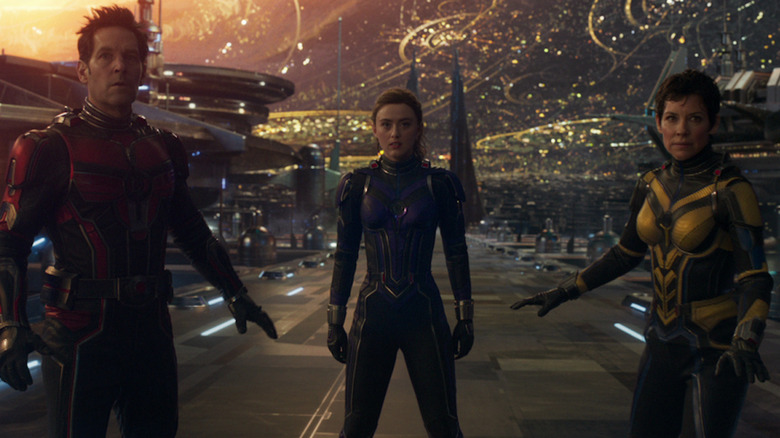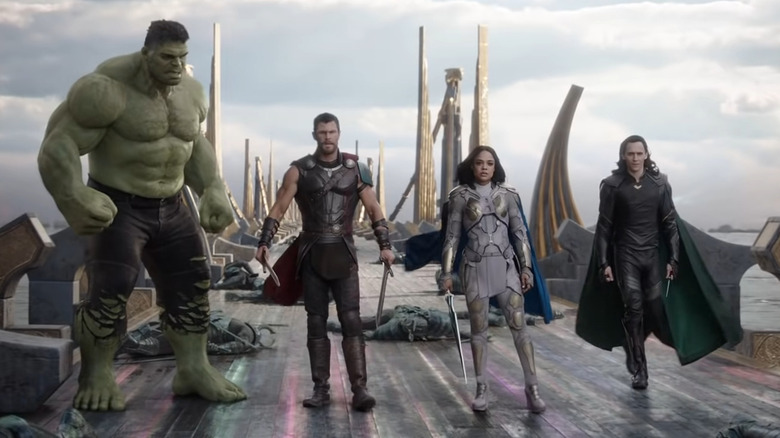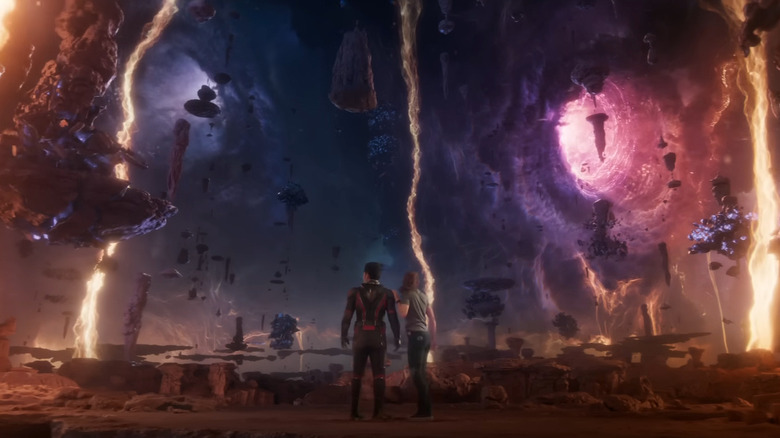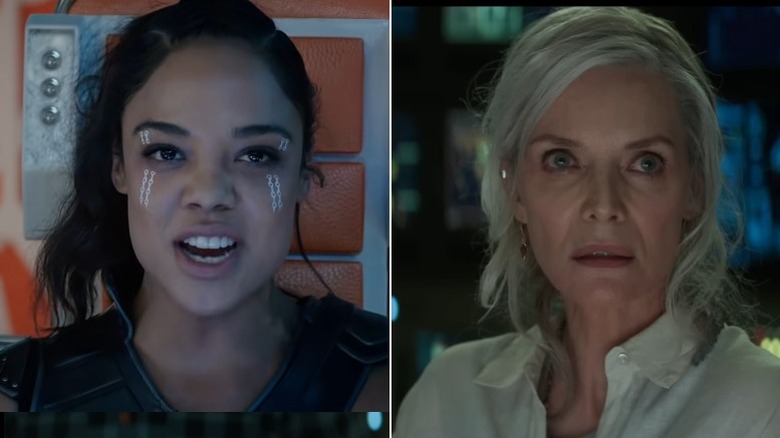Ant-Man And The Wasp: Quantumania Is Scott Lang's Ragnarok
The following article contains spoilers for "Ant-Man and The Wasp: Quantumania."
"Ant-Man and The Wasp: Quantumania" has been out for a few days now. We've had some time to digest the adventures of the buggy superheroes in the Quantum Realm and draw some parallels to other Marvel Cinematic Universe adventures. In the film, Scott Lang (Paul Rudd), Cassie Lang (Kathryn Newton), Hope van Dyne (Evangeline Lilly), Janet van Dyne (Michelle Pfeiffer), and Hank Pym (Michael Douglas) are sucked into the world beneath ours. While there, they meet a band of refugees who are fighting against the despotic ruler of the place, Kang the Conqueror (Jonathan Majors). They band together to take him out, setting Scott (and the rest of the multiverse) on the path to their next chapter.
"Quantumania" has a whole lot in common with another uprising film in the MCU — "Thor: Ragnarok." Whatever you felt about both titles, there are some striking similarities. Kang even asks Scott if he's the Avenger with the hammer. Both heroes are launched out of a world they're familiar with and into an unknown place (San Francisco to the Quantum Realm for Scott and Asgard/Earth to Sakaar for Thor).
Rise up and fight back
Outside of Ant-Man, Thor (Chris Hemsworth) is probably the Avenger with the silliest sense of humor. I don't mean that as a slight. Marvel is known for having slightly more troubled and realistic heroes than DC, so having a few who don't take themselves that seriously is a nice distraction from the darkness of some of the other storylines. There is a lightness about Scott and Thor that makes these films seem like a break from the overarching MCU storyline, even as they advance it with their plots. "Thor: Ragnarok" deals with the destruction of an entire realm, leaving a world full of refugees. "Ant-Man and The Wasp: Quantumania" has a micro-realm full of them as well, after Kang ruled the place for three decades. (I guess? Time is weird down there; sometimes, a short trip to the Quantum Realm is years on Earth-616, and other times it seems like it's exactly the same.)
"Ragnarok" has other refugees as well, with all the gladiators stuck on Sakaar, fighting for the Grandmaster (Jeff Goldblum). In fact, that part of the story has even more parallels. Those refugees rise up after a few superheroes (including Mark Ruffalo's Hulk, Tessa Thompson's Valkyrie, and, I would argue, even Tom Hiddleston's Loki) start the call to take down the oppressor. The same thing happens in "Quantumania." Scott and his friends fight back against Kang, leading the rest of the freedom fighters to a giant brawl for it all. (They were fighting back already, but this is the battle that meant the most and actually took him down.)
A couple of fighters to stand for them all
Even the fact that there are only a couple of beings in the rebellion who stand out from the pack is the same. There are a ton of gladiators that fight back against the Grandmaster at the end of "Ragnarok," but we really only meet Korg (Taika Waititi) and Miek (Sam Khouth) as personalities. In "Quantumania," we have Jantorra (Katy M. O'Brian), Veb (David Dastmalchian), and Quaz (William Jackson Harper).
Even the villains have similar trajectories. Hela (Cate Blanchett) and Kang both want to use a path out of where they are to conquer more territory. Hela wants to use the Bifröst as a bridge to take down other realms, and Kang wants that MacGuffin of a sphere for his lounge chair ship to head off to rule other timelines. Hela is released from prison in "Ragnarok" while Kang is trying to be released in "Quantumania." Neither make it out ... well, as least we think so. Kang the Conqueror might still be alive, though there are certainly enough substitutes in the Council of Kangs to make up for it if he isn't.
Parallel journeys
The theme of dealing with the trauma of the past is at the forefront of both films. In "Ragnarok," we have Valkyrie, who watched Hela slaughter all her fellow Valkyries. She's used alcohol to cover up the pain and trauma she's been dealing with and doesn't want to think or talk about it until she's forced to by Loki. In "Quantumania," Janet has been using avoidance to keep from reliving the battles she had to fight with Kang during her time in the Quantum Realm. She's forced to confront what she's suffered when Cassie's device sends the group back to where it happened. The information and experience they both have are crucial to the ongoing fight in the overall MCU story.
Both films also have a moment of reconnection. Thor finds (and fights) the Hulk (Mark Ruffalo), who he thought was gone, while Scott and his family fight against Darren Criss, aka Yellowjacket, aka M.O.D.O.K. Both end up being allies later. Obviously, the Hulk was always a good guy, but there is still a transformation as he un-Hulks.
In the end, both of these stories launch our heroes into a new chapter. For Thor, it was finding a new home and who he is without Asgard as a home base to return to, as well as giving up the throne to now-King Valkyrie. For Scott, it's realizing that he might have done something wrong after his heroic saving of the entire world. Both of them have to do some reexamination of their lives after these life-changing events.
Anyone up for a one-off Thor/Scott road trip special on Disney+?
"Ant-Man and The Wasp: Quantumania" is in theaters now.



